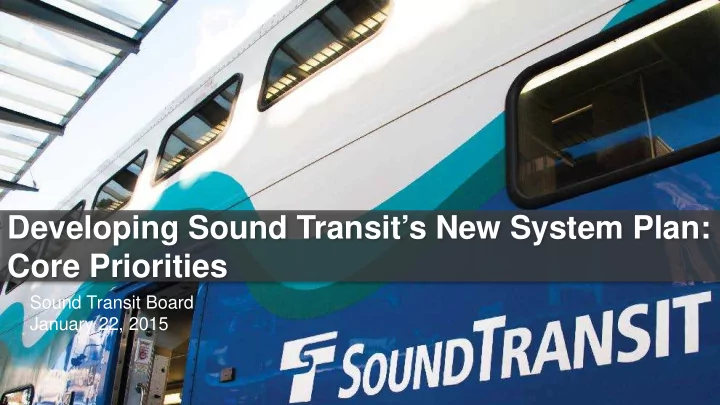

Developing Sound Transit’s New System Plan: Core Priorities Sound Transit Board January 22, 2015
Long-Range Plan Update • Adopted by the Board December 18, 2014 13 changes to the LRP map Update to Plan document 2
System Plan (ST3) Timeline 3
Core Priorities for System Plan Development and Evaluation • Core Priorities developed, in part, from public input received during the LRP update process: – Ridership – Completing the Link light rail Spine – Connecting the region’s designated centers with HCT; Supporting TOD – Socio-economic equity – Integration with other transit operators/transportation systems – Multi-modal access 4
How Core Priorities Guide the ST3 Process in 2015 CORE PRIORITIES ▼ Conceptual System Expansion Scenarios ▼ Scenario Evaluation Measures Based on Core Priorities ▼ Initial Project Evaluation Measures Based on Core Priorities and Scenario Evaluation ▼ Development of Priority Projects List ▼ Project Templates ▼ Detailed Project Testing & Evaluation 5
System Planning Trade-offs • Planning for the Core Priorities will present trade - offs for the Board to consider Examples: • Areas of socio-economic diversity may extend beyond areas of density • Maximizing HCT ridership will vary with the degree of multi-modal integration • Core Priorities and Conceptual System Expansion Scenarios will establish framework for advancing Priority Projects 6
Ridership Why is this a Core Priority? How will we measure this Core Priority? • It’s positively correlated to so many other • Transit mode share benefits, such as: • HCT Ridership – Mode share – Energy consumption – Greenhouse gas reduction* – VMT reduction* – Cost-effectiveness of the transit investment – Transit/Land Use relationship • Higher ridership implies better performance: Speed, Reliability, Frequency * 2014 text amendments to the LRP 7 & Capacity
Completing the Light Rail Spine Why is this a Core Priority? How we will measure this Core Priority? • Included in the Long-Range Plan as a • Progress towards connecting: priority for investment Redmond, North Everett, and • A shared, regional goal Tacoma Mall 8
Connecting Designated Centers / TOD Why is this a Core Priority? How we will measure this Core Priority? • Included in the Long-Range Plan update • Percentage of designated centers served by HCT • Connecting the central Puget Sound’s • Population and employment in designated centers is a regional goal* proximity to HCT stations • Designated Regional Growth Centers not served by the Spine also should be supported* *2014 text amendments to the LRP 9
Socio-economic equity Why is this a Core Priority? How we will measure this Core Priority? • Included in the Long-Range Plan update, a • Percentage of minority and low-income regional goal populations in proximity to HCT stations* • Support economic development efforts* • Encourage creation of housing options* * 2014 text amendments to the LRP 10
Integrate the HCT System/Lower O&M Costs Why is this a Core Priority? How we will measure this Core Priority? • Included in the Long-Range Plan update, a • Transit travel time regional goal • Transit Coverage: Increase in locations accessible within half hour • Efficiency dividend (service hours saved) • O&M cost per trip/boarding/passenger mile 11
Emphasis on Multimodal Access Why is this a Core Priority? How we will measure this Core Priority? • Included in the Long-Range Plan update, a • Ridership regional goal • Percentage of transit access by all modes* • Fully Implements Sound Transit’s Access Policy 12
Next Steps • Confirm Core Priorities – Refine as needed throughout first-half of 2015 • Begin development of Conceptual System Expansion Scenarios, emphasizing Core Priorities – Present Conceptual System Expansion Scenarios for Board consideration • Begin development of evaluation measures for the Conceptual System Expansion Scenarios • More detailed schedule will be reviewed with Board in February 13
(end of document)
Recommend
More recommend